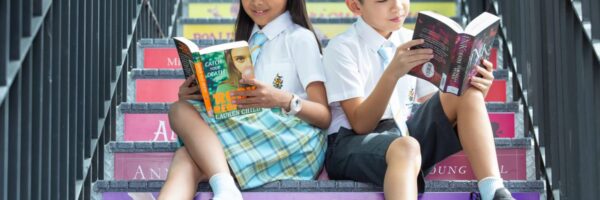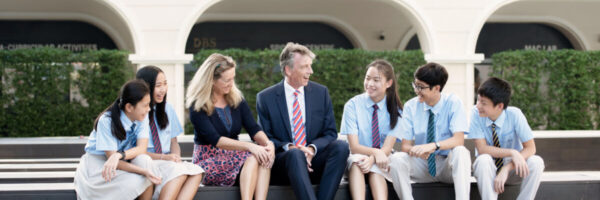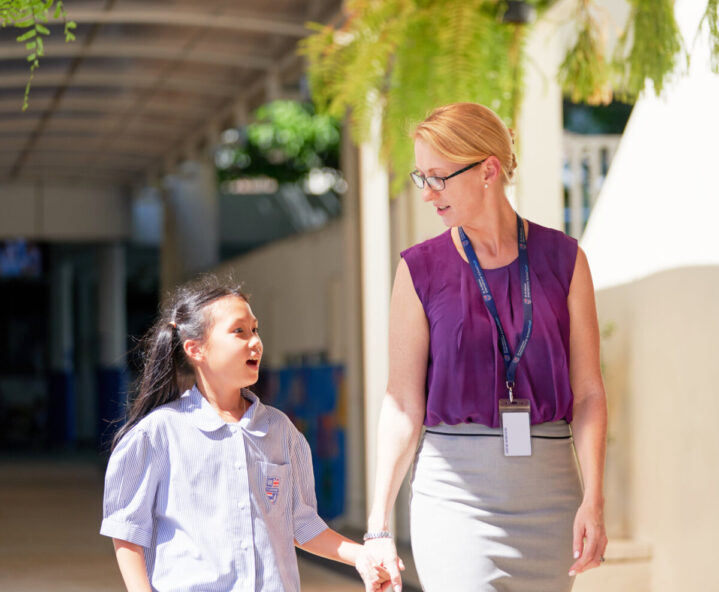
Meet the Head of School – Caroline Ratcliffe
St. Andrews International School Dusit campus will celebrate its 10 year anniversary in 2020.
The school, located opposite the Chitralada Palace and close to Victory Monument BTS, has grown from an Early Years setting with 5 students into a primary school with over 250 students. The school welcomes international students for a nurturing school experience where they benefit from being part of a warm, close-knit community whilst also benefiting from excellent facilities and being part of the Cognita family of 75 schools across the world.
Where are you from?
I grew up in a small town in Kent, the South East of England, otherwise known as the Garden of England due to its rolling green hills and beautiful scenery. My father was from Southampton and my mother Irish; I am one of six children. My father came from a single-parent family without a wealthy background, but he was intelligent and lucky enough to be awarded a scholarship at an outstanding boarding school in the UK. At the age of 5, he was packed off to the school in a black taxi with nothing but a suitcase, one pair of shoes, a pillow and blanket; his mother couldn’t get the day off work to accompany him so he travelled in the taxi all on his own. My father taught me that hard work, a positive mindset and a good sense of humour will get you wherever you want to go in life and his advice has guided me well. My mother has shown me the importance of building strong relationships, to try and always be kind and compassionate and that ‘you only have one life, so you had better use it well!’
What attracted you to teaching?
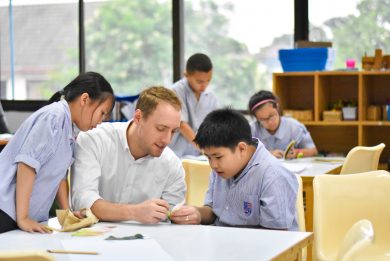
My story is not one of a little girl that played teachers from a young age and knew that she wanted to move into education to follow in the footsteps of her parents and grandparents. In fact, after graduating from Liverpool University, I worked as a recruitment consultant and then decided to go travelling around Asia. I remember waking up the day before I was due to travel to Bangkok and watching the devastating effects of the 2004 tsunami all over the news. We decided to alter our plans and instead, travelled to Laos where I became very sick and ended up in a remote, rural hospital. The staff at the hospital spoke little English but enough to let me know that they thought I needed to have my appendix removed there and then. Lying on that bed with a mosquito net pulled over me with holes in, you might say that I had bit of an epiphany. Scared that
I wouldn’t survive this experience, I promised to myself that if I made it out of there alive, I would work to make a difference in the world. Fortunately, with the help of antibiotics and a translator from the British Embassy, I made it home and decided to enrol on a teaching course in a primary school in Brixton, London.
What is your educational background?
My first teaching experience was in a primary school in the middle of a council estate in Brixton, which at the time, was in the top 2% most socially deprived areas in the UK. I completed my Graduate Teacher Programme in this school, and then went on to complete a Masters in Primary Studies in Education whilst working at this school. Although it was extremely hard teaching children in such a difficult setting, this experience made me the teacher that I am. I feel privileged to have started my teaching journey in a school where I was surrounded by extremely skilled practitioners, they managed to make teaching classes of 30 children with many challenges, look so easy.
Do you have a personal educational philosophy?
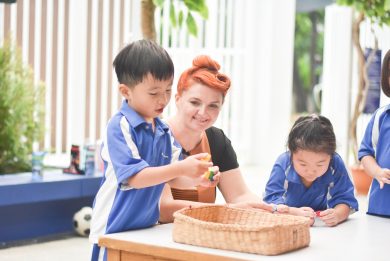
My personal educational philosophy is simple: primary education is a time for discovery and for moments that instil a love of learning deep inside the children. Relationships are everything so if teachers can inspire their students to enjoy learning, develop their character and encourage a global perspective, our children will have the key ingredients of a well-rounded student who will thrive academically, socially and emotionally in this ever-changing world.
When did you become a head teacher?
In 2016, Cognita acquired St. Andrews Dusit campus and
I moved into my current role as Head of School. This is my third year at St. Andrews Dusit and prior to that, I worked at the St. Andrews Sathorn campus for 6 years.
What are some of the school’s greatest accomplishments?
Last year, our school was awarded Cognita Asia’s School of the Year award which we are extremely proud of, there has been a real transformation at Dusit over the past 3 years, so it is wonderful to have our efforts recognised! We also won an award for our charity initiative where we worked with Solar Buddy and the Baan Dek foundation to raise money to buy solar lights, assembled them in school, learnt about energy poverty and then sent them to children in Northern Thailand who do not have electricity. The initiative was so successful that our family of schools in Thailand, Vietnam, Hong Kong, Brazil, Singapore, Spain, Chile and the UK joined us. To date we have successfully distributed 3,114 solar lights to children that have no electricity in Thailand, Papua New Guinea, Tanzania and Vietnam. These lights will help to replace the use of kerosene lamps which contribute to killing more people per year than HIV and Malaria combined.
What are some of the biggest challenges this school faces?
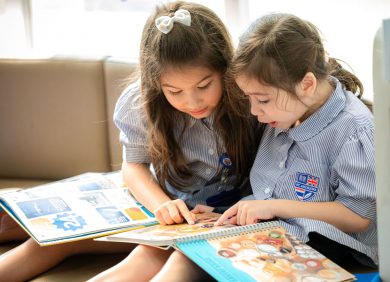
Staff retention is a challenge that all international schools face, with the average annual teacher turnover for international schools at about 25%. At Dusit, we have seen the numbers improve year on year with only 10% of teachers moving on from Dusit last year. When you work hard to create a culture in a school, it is really important that you take time to organise a clear orientation programme so that if teachers do leave and new teachers join, they know the expectations of your school or as we say… ‘how Dusit does it.’ Another challenge is the high mobility of students. Being an international school, we often have children joining throughout the year, coming from different education systems. Due to this, it is important that we work closely with new children and parents to find out what they already know and what gaps in learning there might be. The teacher then personalises the child’s learning experiences in class to ensure that they are building on what they already know and filling in those gaps quickly with support from our highly skilled teachers and, if needed, our learning support department so that they can catch up with their peers.
What are the benefits of an International school education?
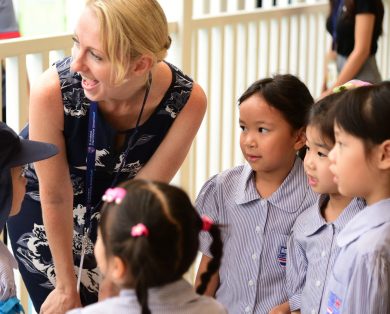
The world of international education is a melting pot and, learning with a global perspective, ensures that our children are exposed to different cultures and languages, enriching society in the process and broadening the academic experience for everyone. At Dusit, we have 20 different nationalities which helps to increase students’ cultural awareness and fosters their understanding and appreciation of those who come from a different background to their own. Having a global perspective allows students to see the world as an exciting place with limitless and changing opportunities. They learn to use languages as a key to accessing learning, culture and wider opportunities and are taught the importance of social responsibility and the commitment to help others and make a positive difference in the world.
How do you keep up to date with current trends in international education to ensure your school keeps improving?
We are very fortunate that St. Andrews, Dusit is part of the Cognita family of schools. This means that we are privy to experts such as Sir Kevan Collins, chairman of Cognita’s Education Advisory Board and chief executive of the Education Endowment Foundation (EEF) who is at the forefront of educational research in the UK. Through links with experts like Sir Kevan, we are supported in building our professional capacity through training and development so that our teachers are better able to help our students, using evidence around effective pedagogies to ensure the biggest impact on student gains. Each year we are visited by a team of safeguarding and health and safety independent advisors that spend time in our schools to ensure that we have the highest standards in these areas. We know that if children are not happy, healthy and safe, they will not be learning to their full potential. In addition to this, we are visited annually by an advisor from the Education Trust and accredited by them on a 3 year cycle. I am proud to share that our most recent accreditation rated students’ personal development, teaching and learning, our curriculum, the quality and quantity of the school’s accommodation and resources, how well the school cares for and supports its students, the school’s partnership with parents and the community and leadership and management all outstanding.
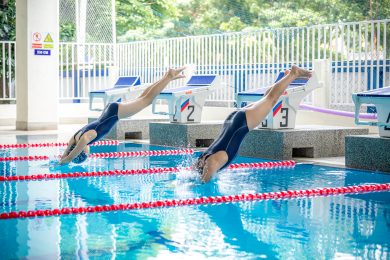
What extracurricular opportunities (sports, clubs, community service, competitions) are available for students?
We are proud to offer a plethora of extracurricular opportunities which include inline skating, parkour, peripatetic music lessons taught by Yamaha Music School, cooking classes, tennis, football and swimming squad training… there are up to 50 clubs taking place in school each week! In addition to this, we are part of TISAC, a group of 14 schools that work together to provide our children with experiences and competitive events such as basketball, swimming galas and dance, music and drama competitions each year.
How does the school provide a sense of community?
We pride ourselves on our close-knit community and have an extremely active PTG and Class Representative Committee. We hold various events throughout the year such as school BBQs, coffee mornings and parent workshops – parents are encouraged to get involved in our school calendar of events and of course, their child’s education. We have an open-door policy which means that teachers and our office staff are available to parents whenever needed. I am on the gate in the mornings, welcoming our Dusit families and am visible around the school so that parents can come to me when necessary. We have an annual Voice of the Parent survey that is sent out to parents so they can feedback on any areas they would like to see improvements and can also offer positive comments about the school, the leadership team and the quality of learning at school. Parents see that we are a listening school that wants to be the ‘best at getting better’ and so they trust that we will do the best for the children in our care to ensure that their educational experience at Dusit is topnotch!
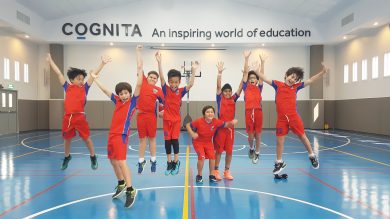
Where do students go after they graduate?
When our students leave us in Year 6, we offer a seamless transition to our sister school, St. Andrews International School, 107 campus, in Bearing. Students are dropped off at our campus each morning and they ride the free bus there each day, there are then two buses back to Dusit at the end of the school day.


